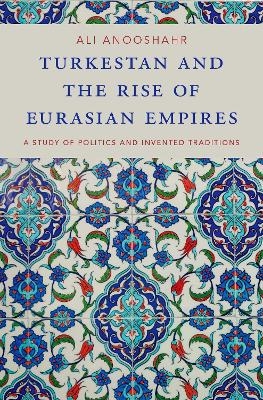
Turkestan and the Rise of Eurasian Empires
A Study of Politics and Invented Traditions
Seiten
2018
Oxford University Press Inc (Verlag)
978-0-19-069356-5 (ISBN)
Oxford University Press Inc (Verlag)
978-0-19-069356-5 (ISBN)
Turkestan and the Rise of Eurasian Empires studies how fifteenth and sixteenth century chroniclers grappled with the Turkestani or Turco-Mongol origin stories of their patrons in the newly forming states of the Ottomans, Safavids, Shibanids, Moghuls, and Mughals.
It has long been known that the origins of the early modern dynasties of the Ottomans, Safavids, Mughals, Mongols, and Shibanids in the sixteenth century go back to "Turco-Mongol" or "Turcophone" war bands. However, too often has this connection been taken at face value, usually along the lines of ethno-linguistic continuity. Turkestan and the Rise of Eurasian Empires argues that the connection between a mythologized "Turkestani" or "Turco-Mongol" origin and these dynasties was not simply and objectively present as fact. Rather, much creative energy was unleashed by courtiers and leaders from Bosnia to Bihar (with Bukhara and Badakhshan along the way) in order to manipulate and invent the ancestry of the founders of these dynasties.
Through constructed genealogies, nascent empires founded on disorganized military and political events were reduced to clear and stable categories. With proper family trees in place and their power legitimized, leaders became far removed from their true identities as bands of armed men and transformed into warrior kings. This created a longstanding pattern of false histories created by the intellectuals of the day. Essentially, one can even say that Turco-Mongol progenitors did not beget the Ottoman, Safavid, Mughal, Mongol, and Shibanid states. Quite the contrary, one can instead say that historians writing in these empires were the ancestors of the "Turco-Mongol" lineage of their founders. Using one or more specimens of Persian historiography, in a series of five case studies, each focusing on one of these early polities, Ali Anooshahr shows how "Turkestan", "Central Asia", or "Turco-Mongol" functioned as literary tropes in the political discourse of the time.
It has long been known that the origins of the early modern dynasties of the Ottomans, Safavids, Mughals, Mongols, and Shibanids in the sixteenth century go back to "Turco-Mongol" or "Turcophone" war bands. However, too often has this connection been taken at face value, usually along the lines of ethno-linguistic continuity. Turkestan and the Rise of Eurasian Empires argues that the connection between a mythologized "Turkestani" or "Turco-Mongol" origin and these dynasties was not simply and objectively present as fact. Rather, much creative energy was unleashed by courtiers and leaders from Bosnia to Bihar (with Bukhara and Badakhshan along the way) in order to manipulate and invent the ancestry of the founders of these dynasties.
Through constructed genealogies, nascent empires founded on disorganized military and political events were reduced to clear and stable categories. With proper family trees in place and their power legitimized, leaders became far removed from their true identities as bands of armed men and transformed into warrior kings. This created a longstanding pattern of false histories created by the intellectuals of the day. Essentially, one can even say that Turco-Mongol progenitors did not beget the Ottoman, Safavid, Mughal, Mongol, and Shibanid states. Quite the contrary, one can instead say that historians writing in these empires were the ancestors of the "Turco-Mongol" lineage of their founders. Using one or more specimens of Persian historiography, in a series of five case studies, each focusing on one of these early polities, Ali Anooshahr shows how "Turkestan", "Central Asia", or "Turco-Mongol" functioned as literary tropes in the political discourse of the time.
Ali Anooshahr is an Associate Professor of History at the University of California, Davis. He is a scholar of Islamic Empires and focuses particularly on the transmissions of texts and individuals along networks that connected India, Iran, Central Asia, and the Ottoman Empire.
Acknowledgments
Chapter One - Introduction
Chapter Two - The Origins of the Question of Origins
Chapter Three - The Early Ottomans in Idris Bitlisi's Hasht Bihisht
Chapter Four - The Early Safavids
Chapter Five - Uzbeks and Kazakhs in Fazl Allah Khunji's Mihmannamah-i Bukhara
Chapter Six - Mongols in the Tarikh-i Rashidi
Chapter Seven - Timurid India
Chapter Eight - Epilogue
Notes
Bibliography
Index
| Erscheinungsdatum | 25.04.2018 |
|---|---|
| Verlagsort | New York |
| Sprache | englisch |
| Maße | 239 x 157 mm |
| Gewicht | 476 g |
| Themenwelt | Geisteswissenschaften ► Archäologie |
| Geschichte ► Allgemeine Geschichte ► Mittelalter | |
| Geisteswissenschaften ► Geschichte ► Regional- / Ländergeschichte | |
| ISBN-10 | 0-19-069356-8 / 0190693568 |
| ISBN-13 | 978-0-19-069356-5 / 9780190693565 |
| Zustand | Neuware |
| Informationen gemäß Produktsicherheitsverordnung (GPSR) | |
| Haben Sie eine Frage zum Produkt? |
Mehr entdecken
aus dem Bereich
aus dem Bereich
eine neue Geschichte des Mittelalters
Buch | Hardcover (2023)
C.H.Beck (Verlag)
38,00 €


